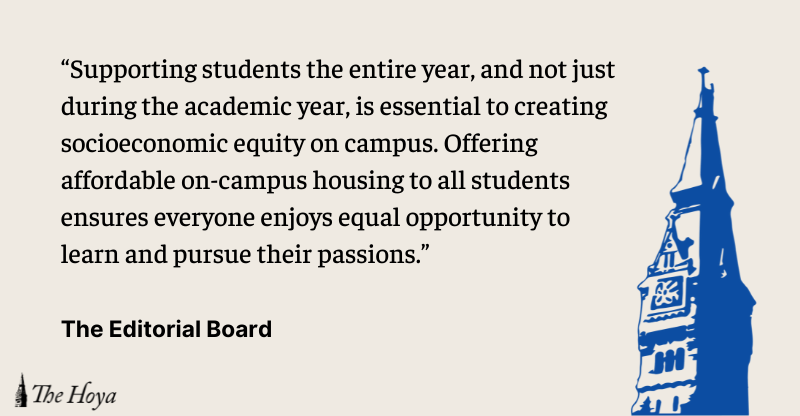When Axel Abrica (COL ’25) saw a need for more inclusive housing on Georgetown University’s campus last month, he sat down with fellow student leaders to form the Summer Housing Committee.
“We want to have the university have something set in stone in terms of summer housing, each recurring year,” Abrica told The Hoya.
Their work, housed under the Georgetown University Student Association (GUSA), fits into a larger context of Georgetown students solidifying their plans for summer break. While many students return home for the summer, a substantial number choose to stay in Washington D.C., some in order to pursue a job or internship in the city, and others because they face housing insecurity.
To promote housing equity for those students staying in D.C., Abrica and his team distributed a petition encouraging the university to improve access to on-campus, affordable summer housing. The petition focuses on university-sponsored housing provisions for students who cannot afford D.C. rent, a more accessible and empathetic approach to applications for housing, and a permanent housing plan.
In light of these concerns, the Editorial Board encourages students to sign this petition and specifically calls on the university to improve summer housing accessibility by guaranteeing housing for housing-insecure students and offering more affordable housing for students pursuing internship opportunities in D.C. Permanently implementing these measures will help to alleviate the effects of socioeconomic inequality on campus.
The university offers housing to those participating in summer classes, who are eligible for financial assistance, or local internships. They also take into consideration the needs of students outside these situations, according to a university spokesperson.
“Leaders in the offices of Residential Living, Student Affairs and Student Financial Services work with students who won’t be enrolled in classes this summer and who face housing insecurity and other challenges, to determine how to assist them,” the spokesperson wrote to The Hoya. “This can be a complex, individualized process presenting a variety of on-campus programs and broader resources available to each student.”
Under the current system, Georgetown students with internships in Washington, D.C., and those taking classes on campus may live in Georgetown apartments and townhouses over the summer for a minimum of $431 per week. They also offer financial support for summer housing through a number of channels like certain on-campus jobs, which directly provide housing, and programs like the Georgetown Scholars Program (GSP).
According to Abrica, this isn’t enough.
“One thing that we wanted to avoid was having students be required to do something, for example, take summer classes, or take up a job, just to have access to summer housing,” he said in an interview with The Hoya.
For instance, Esha Sharma (SFS ’25) said she looked to the university for housing as she pursued internship opportunities in the district, but quickly hit significant financial barriers.
“The cost of summer housing is extremely high, often higher than any compensation I could get from an internship,” she wrote to The Hoya. “I ended up switching to applying to mostly remote internships so I didn’t have to worry about funding for D.C.”
Georgetown students like Sharma are often compelled by the career opportunities that Washington D.C. offers, and want to apply and accept jobs and internships in the District for Summer 2022. However, even with the university’s current housing options, it is still prohibitively expensive for some, especially those accepting unpaid internships. Furthermore, D.C. rent rates outside university housing are exorbitantly high, posing yet another financial barrier for students.
There are several internship grants offered through Georgetown, including the Idol Family Summer Fellowship offered through the CALL and the Penner Family Experiences Award. These grants do offer housing or funding intended to alleviate the living costs of accepting low-paying or unpaid internships. However, these opportunities are limited, and require students to have secured an internship prior to applying.
On the other hand, students who don’t need to take into account factors such as the cost of housing or their chances of getting accepted into a financial assistance program — those who belong to a wealthier socioeconomic stratum — have a higher probability of pursuing these opportunities. Thus, the current systems in place perpetuate these barriers to opportunities that all students at Georgetown should have access to.
Admittedly, offering free and low-cost housing to an indeterminate number of students could be costly for the university, especially given its recent financial woes as a result of decreases in revenue during the pandemic. However, the petition cites the nearly $800 million increase in Georgetown’s endowment, from $1.8 billion to $2.59 billion from 2020 to 2021, suggesting that this may entail an increased ability to financially support students over the summer.
Supporting students the entire year, and not just during the academic year, is essential to creating socioeconomic equity on campus. Offering affordable on-campus housing to all students ensures everyone enjoys equal opportunity to learn and pursue their passions.
Ultimately, education is a year-round pursuit, and prioritizing students’ safety and ability to learn promotes the idea that learning does not stop at the classroom door. Improving summer housing offerings is an essential step toward building a stronger, more supportive community at Georgetown that uplifts all of its students equally.
The Hoya’s editorial board is composed of six students and is chaired by the opinion editors. Editorials reflect only the beliefs of a majority of the board and are not representative of The Hoya or any individual member of the board.














